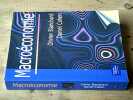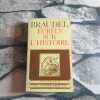-
Language
English (1)
French (1102)
-
Century
16th (2)
17th (9)
18th (56)
19th (95)
20th (604)
21st (141)
-
Countries
Belgium (263)
Brazil (3)
Denmark (228)
France (446)
Netherlands (146)
Switzerland (17)
-
Syndicate
ILAB (410)
NVVA (146)
SLAM (171)
Politics Versus Markets: International Differences in Macroeconomic Policies: A Study in Contemporary Economic Problems
Aei Press 1982 39 pages in8. 1982. Agrafé. 39 pages.
Très bon état
Blanc Georges Dussauge Pierre Anastassopoulos Jean-Pierre
Reference : 500139219
(1992)
ISBN : 9782130391203
Visages et caractères: La science morphopsychologique
Presses Universitaires de France - PUF 1992 1992. loose_leaf.
Bon état
Macroéconomie
Pearson Education 2002 XII-596 pages in-8. 2002. Broché. XII-596 pages. Seconde édition
Très bon état
Appraising Economic Theories: Studies in the Methodology of Research Programs
Edward Elgar Publishing Ltd 1991 592 pages in8. 1991. Cartonné jaquette. 592 pages.
très bon état de conservation intérieur propre
On the Nature of Organizations
John Wiley & Sons Inc 1974 368 pages 23x2 4x16cm. 1974. Cartonné jaquette. 368 pages.
Bon Etat de conservation intérieur propre avec sa jaquette (ternie)
Annuaire de l'Economie politique et de la statistique. 1897.
Paris, Guillaumin, 1897. 90 X 150 mm. relié demi-chagrin noir, dos à nerfs orné de caissons dorés. 1052 pp.
Phone number : 41 021 964 60 10
Danske provinskøbmænds vareomsætning og kapitalforhold 1815-47.
Aarhus, 1977. Orig. papbd. 435 pp. (disp.).
Economia de la transportes
Buenos Aires (Mexico), Fondo de Cultura Economica 1956 159pp., br.orig., texte en espagnol, bel état, [3ème édition en espagnol]
Inconvénients des Droits féodaux. Nouvelle édition, à laquelle on a joint que Montesquieu a écrit sur les Fiefs, dans les Livres XXX & XXXI de l'Esprit des Loix. A Paris, 1776. - (Bound with:) (MIRABEAU, H.G. RIQUETTI DE.) Essai sur le despotisme.
Londres, 1775. 2 volumes in 1. (1), 155, (1) pp.; 275, (3) pp. 8vo. Contemporary marbled calf, spine gilt with raised bands, red morocco label with gilt lettering, small damage to joint at the foot of the volume. First work: Kress 7193; not in Goldsmiths; not in Einaudi; this edition not in INED; cf: Camus 1566; Peinot, Livres Condamnés, i, p. 43 (with wrong date). Third edition, published in the same year as the first edition, first edition with this title. Pierre-François Boncerf, French writer on agrarian subjects. While a clerk in the ministry of finance under Turgot he published a pamphlet, Les inconvénients des droits féodaux. According to Palgrave the work was published with the consent of Turgot. In it he attacked the contemporary system of feudal dues as ruinous to those who pay them, of little advantage to its benificiaries and contrary to the principles of freedom. The solemn condemnation of the pamphlet by the parlement of Paris, which the king vetoed, and the ensuing controversy in the press, in which Voltaire took a prominent part, established Boncerf's reputation and resulted in the translation of the work into many European languages. The pages 70-end contain the relevant texts by Montesquieu. The first edition was published anonymously, the second edition under the assumed name M. Francaleu. Second work: Higgs 6537; INED 3188 (1831 edition); Martin & Walter 24430; not in Goldsmiths (see 11518 for the second edition).First edition. Philosophical and political study on despotism and its effects it pretents to refute the theories of Rousseau while the author in reality attacks straight forward the government. Of actual value seems again his remark 'La nation finit toujours par être plus puissante que le tyran lorsque le pouvoir arbitraire parvenu à son dernier délire a dissous tous les liens de l'opinion et épuisé les ressources que la terre offre à ceux qui la cultivent en liberté. Ainsi les hommes se vengent tôt ou tard.' 'Dans cet insolent libelle, intitulé Essai sur le Despotisme, sous couleur de réfuter les théories de Jean-Jacques sur la bonté naturelle de l'homme, l'auteur s'attaquait de front aux pouvoirs' (Duc de Castries, Mirabeau, p. 105). Important work proclaiming democratic ideas and openly attacking despotism: 'Après cette vue philosophique générale, l'ouvrage s'attaquait seulement au 'despotisme d'un seul'' (Duc de Castries, op.cit)


(NVVA, )
Phone number : 31 20 698 13 75
Essai sur quelques interventions en matière de crise - Pathologie et thérapeutique économiques
Paris, Recueil Sirey 1938 142pp., dans la série "Etudes économiques" Tome VI, br.orig., 25cm., cachet, bon état, E41773
Towards a New Economics: Critical Essays on Ecology Distribution and Other Themes (Economists of the Twentieth Century)
Edward Elgar Publishing Ltd 1992 368 pages in8. 1992. Cartonné jaquette. 368 pages.
Très bon état avec sa jaquette intérieur propre bonne tenue
Accords de compensation et conventions de paiement - la compensation en Belgique
Anvers, Veritas 1938 207pp., dans la série "Université de Louvain. Collection de l'Ecole des Sciences Commerciales et Economiques", br.orig., cachet, bon état, E41556
Lettre sur le Luxe.
A Franckfort, Chez Joseph-André Vanebben, 1745. [8], 96 pp. Small 8vo. Modern half calf, corners, marbled boards, gilt lettering to spine. Querard 516: Conlon 45:606; INED 738; Goldsmiths' 8184; Kress S.3721; not in Einaudi; not in Mattioli. Scarce first edition of this interesting contribution to "the heated and prolonged debate on luxury that took place during the eighteenth century (which can be) best understood as part of the age's growing awareness of fundamental transformations taking place in its socio-economic order. Some of the period's most important and influential thinkers joined in this debate, engaging in what amounted to a comprehensive reevaluation of socioeconomic, political and economic thinking. (.....) This is undoubtedly one of the reasons why the debate on luxury resonated so widely and deeply. At its very inception, it called into question the nature and survival of traditional values in an evolving commercial civilization" (Encyclopedia of the Enlightenment, vol 2, p. 440.) L'auteur, né à Pondichery en 1690, mort à Paris en 1757, "distingue entre le luxe de génie qui est utile, et le luxe de moeurs, celui de la table, des habits et des meubles, qui est néfaste" (INED.)The "Letter" is followed by Examen du IXe chapitre de l'Essai politique sur le Commerce (by Melon), Lequel renferme une espece d'Apologie du Luxe, followed by Fragmens d'un Auteur Grec, trouvés depuis peu dans la Bibliothèque d'Oxfort, & traduits en François, which also deals with the topic of "luxe", and followed by Dialogue pourquoi il est si difficle aux personnes d'un certain mérite de s'avancer dans le monde.Boureau Deslandes Lettre sur le luxe, "written for the Académie royale des sciences de Paris and royal academies of St. Petersburg, London, Edinburgh, Bologna, Prussia, and Sweden, revealed his growing concerns that Frenchmen failed as subjects and citizens. The Lettre begins: "Luxury is a pernicious thing in a state." Boureau Deslandes defined luxury as "an agreeable or brilliant superfluity, that adds to postmortem the indispensable needs of life: they are goods, advantages that one can absolutely do without, but that one procures for oneself out of vanity, due to an intemperance of taste, often because of a strong attachment to what is in style; finally, it is an excess where the price or value depends solely on imagination, and that has nothing in itself to do with reality." He distinguished between two kinds of luxury: luxe de genie and luxe de moeurs. The first was a positive luxury that allowed for the progress of culture, and the development of beauty and perfection; the other led to the corruption of taste and morality. Boureau Deslandes lauded the "noblest" examples of art, painting, literature, philosophy, and science that attested to the "perfection" of culture and the "honor of the state." Such products contrasted against the luxe de table, luxe d'habits, luxe de meubles and "ridiculous" excesses that inundated the market. "France," he argued, "is now a country of decoration," where "simple mores conforming to nature are banished." Extravagance, he described, was most apparent in Paris, where trends in furniture and jewelry changed three times a year. Luxury, he continued, created disorder in the state by confounding orders and ranks. Clothes, fashion, and tastes tended toward uniformity until one failed to distinguish "those who by birth or by employment must necessarily be distinguished." Worse, useless commodities "ruined health" and "rendered men less strong, less courageous, less able to continue work." This luxe, Boureau- Deslandes warned, "prepared the liveliest nation for death"" (Takeda, Junko Thérèse. Between Crown and Commerce: Marseille and the Early Modern Mediterranean, p. 191 ff.) - A bit browned.


(NVVA, )
Phone number : 31 20 698 13 75
Reflexions su la Milice et sur les Moyens de rendre L'Administration de cette Partie uniforme & moins onéreuse.
No place, no publ., 1760. Small8vo. Contemp. Full mottled calf. Richly gilt spine. Titlelabel with gilt lettering. A paperlabel pasted on lower part of spine. Stamp on title-page. Title-page in red and black. (4),196 pp. Clean and fine, printed on good paper.
First edition. Dealing with the less costly ways of organizing the militia in France. - Goldsmith's, 9638. - Higgs, 2410.Claude Bourgelat (1712-1779), is known to all those familiar with the history of veterinary education as the founder of the first veterinary school in the world at Lyons in 1762.
L'état corporatif en Italie (L'histoire du fascisme: débuts, organisation. Des syndicats aux corporations. Nouveaux statuts. Derniers faits)
Paris, Aubier 1935 253pp., dans la série "Histoire du travail et de la vie économique", br.orig., 19cm., cachet, bon état, E42108
La chasse aux larrons, ou avant-coureur de l'histoire de la Chambre de Justice. Des livres du bien public, et autres oeuvres faits pour la recherche des financiers, & de leurs fauteurs.
A Paris, 1618. With title-engraving depicting hanging speculators and usurers, the usurers also being chased while throwing away money. Title printed in red and black. (14), 96 pp. Small 4to. Later speckled calf, gilt triple fillets on sides, spine gilt in compartments, green label with gilt lettering. Goldsmiths 470; Lindsay & Neu 4039 (other issue); Welsh, Second Checklist, 609 (edition of (8), 85 pp); Bourgeois & André 2440; not in Kress; not in Einaudi; not in Mattioli; not in INED. First edition. In the same year also an edition in 8vo was published, this 4to edition being very rare. The author wrote several works of a vehement nature, against the financiers and provoked lively polemics. He demands the re-establishment of the Chambre de Justice which had been created under Henry IV. The Chambres de Justice were 'Commissions extraordinaires établies dans des circonstances spéciales pour juger de cas particuliers: notamment commissions destinées, après de temps de désordres et de malversations graves, à punir et à dépouiller les fianciers enrichis par ces malversations' (Marion, Dictionnaire des Institutions). Three years earlier Jean de Beaufort had already insisted on investigations against financial malversations in his Trésor des trésors. The 'Dédicace au Roy' starts: 'Sire, De tous tems ceux qui manient les fiances n'ont pas esté seulement soupconnez d'y mal verser, mais convancus de les voller ouvertement, artistement. Dont est venu ce vieil proverbe qui roulle encore entre le vulgaire: l'Argent du Roy est sujet à la pince.' - Unobtrusive brown spot (erasing previous owners name ?) on title-page.


(NVVA, )
Phone number : 31 20 698 13 75
Economie rurale considérée dans ses rapports avec la chimie, la physique et la météorologie. Tome Premier et Tome Second
Paris, Béchet Jeune, 1851. 2e édition revue, corrigée et augmentée. 2 vol. in-8 reliés demi-veau bleu, dos très élégants : décor doré, ix-819 & 767 pp. Bon état : rousseurs in-t. Reliure légèrement frottée.
Bourse: Les bases à connaître pour ne jamais perdre pied
Bordas Editions 1993 1993. Broché.
Bon état
LA JEUNE MENAGERE PRATIQUE
1939 demi-reliure en toile rouge (half cloth-bound) grand in-octavo, dos long (spine without raised band) - titre frappé or sur le dos et le premier plat (gilt title on the spine and the front cover), tranches lisses (smooth edges), illustrations : 154 figures in texte (pictures in text), II+340 pages, 1939 à Paris Librairie Hachette,
préface de M. Boutier - bon état (very good condition)
Bowles S.; Gordon D.M. Y Weisskopf T.E
Reference : 100138843
(1992)
ISBN : 8420627356
Tras la economía del despilfarro: una economía democrática para el año 2000
ALIANZA ED 1992 830 pages in8. 1992. Broché. 830 pages.
Très bon état bonne tenue intérieur propre
Wages and Income in the United Kingdom since 1860. - [SIMON KUZNETS'S COPY]
Cambridge, Cambridge University Press, 1937. 8vo. In the original green full cloth with the original dust wrapper. Dust wrapper with wear, lacking 5 mm to top and bottom of spine and the upper right part of the back. Apart from the dust-jacket, a very fine and clean copy. XIX, (1), 151 pp.
Economist Simon Kuznets's copy of the first edition of Bowley's conclusive work on wages and income in United Kingdom. Bowley produced a stream of studies on British economic statistics, beginning in the 1890s with works on trade and on wages and income, and proceeding to studies of national income in the 1920s and -30s. The present, although rather short, work became highly influential, as it introduced much of Bowley's more technical work to a broader public.Simon Smith Kuznets (1901 - 1985) Russian American economist was awarded the Nobel Prize in Economic Sciences for ""his empirically founded interpretation of economic growth which has led to new and deepened insight into the economic and social structure and process of development"".Kuznets revolutionized econometrics with the important book ""National Income and Its Composition, 1919-1938. Published in 1941 which eventually formed the famous Kuznets Curve. This work relied to a large extent on Bowley's work on national income.
Ecrits sur l'histoire
Editions Flammarion 1969 320 pages 10 8x1 6x17cm. 1969. mass_market. 320 pages.
Bon état
Braun Karen W. Tietz Wendy M. Harrison Walter T
Reference : 500097327
(2009)
ISBN : 9780136023654
Managerial Accounting: International Edition
Pearson 2009 864 pages 21 6x2 8x27 6cm. 2009. Broché. 864 pages.
Très bon état
 Write to the booksellers
Write to the booksellers

























